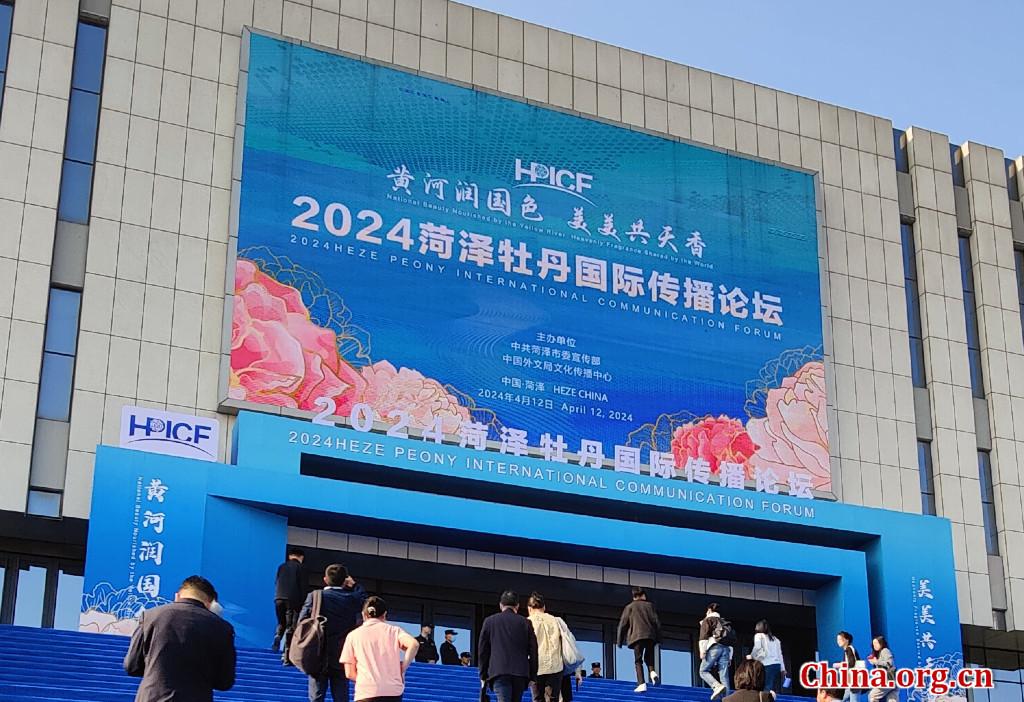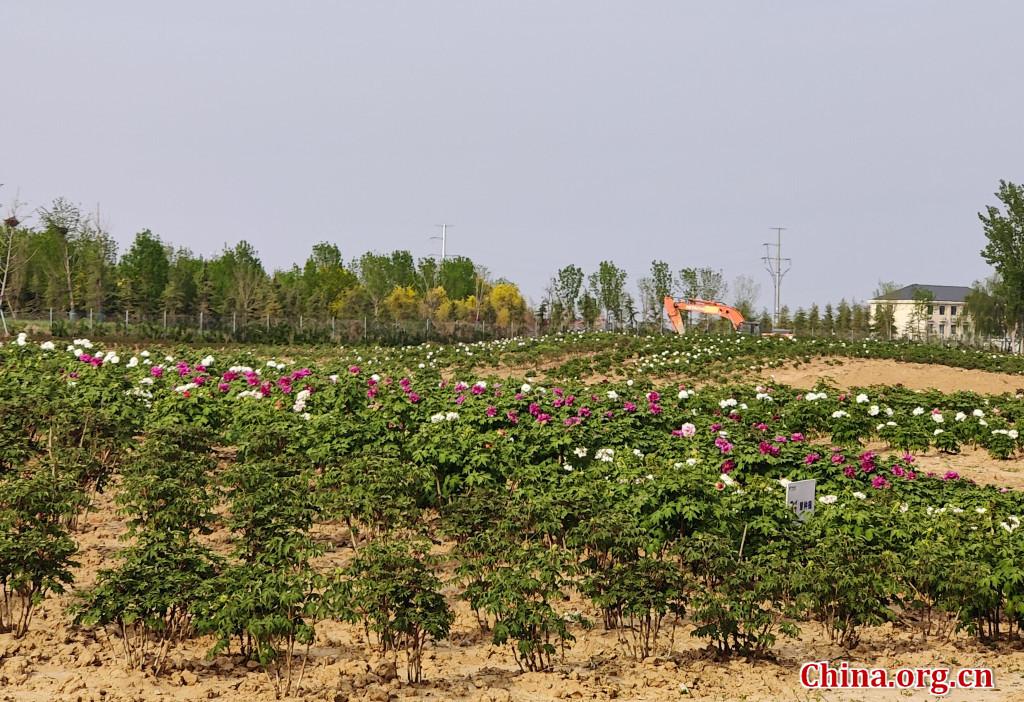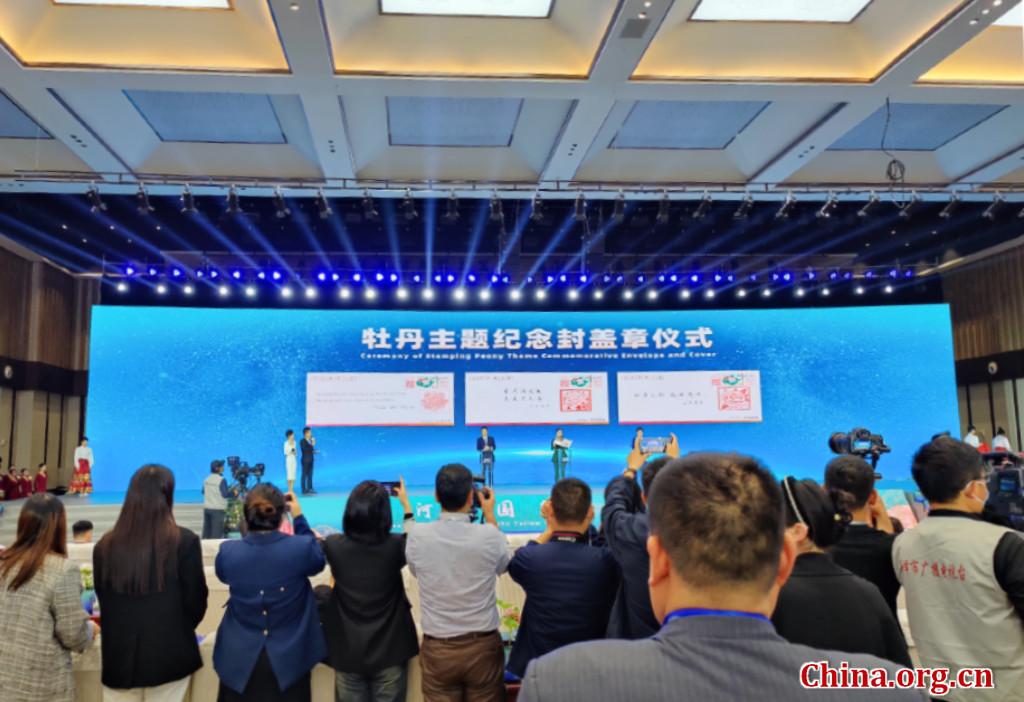
 0 Comment(s)
0 Comment(s) Print
Print E-mail China.org.cn, April 19, 2024
E-mail China.org.cn, April 19, 2024
Entrance of the 2024 Heze Peony International Communication Forum held in the Peony district of Heze, Shandong province, April 12, 2024. [Rochelle Beiersdorfer/China.org.cn]
The 2024 Heze Peony International Communication Forum was recently held in Heze, Shandong province, on April 12. In conjunction with the municipality's annual Heze International Peony Cultural Tourism Festival which runs until May 15, the forum gave scholars, diplomats and the media from both home and abroad the opportunity to explore Heze's local peony-based economy and the cultural prominence that this flower holds within Chinese society. Organized by the Publicity Department of the CPC Heze Municipal Committee and the Center for International Cultural Communication, China International Communications Group (CICG), the theme of the forum was international cultural exchange through local peony culture. CICG is China.org.cn's parent company.
A symbol for a vast array of intangible qualities, such as prosperity, honor and happiness, the peony flower is of great importance within Chinese culture, being named China's national flower by the China Flower Association in 2019. As a cultural symbol, peony blossoms have been a prominent motif in the architecture of imperial palaces, past scholarly culture as well as folk art. During his keynote speech at this year's forum, Pan Lusheng, Vice Chairman of China Federation of Literary and Art Circles, Vice President of China Public Relations Association and Chairman of Chinese Folk Literature and Art Association, explained the symbolic usage of peonies in imperial China, highlighting its presence in pottery, clothing and paintings during the Tang, Ming and Qing dynasties.
The first inclusion of peonies within Chinese culture is credited to a medical book from the Eastern Han dynasty. Inscribed on bamboo, the entry noted that peony consumption could be used as a cure for blood stasis, or the stagnation of blood circulation throughout the body. According to findings by researchers focusing on tea analysis, drinking white peony tea has many medicinal benefits, such as helping to reduce bone loss and high cholesterol. The local peony tea manufacturers in Heze market their tea made with the flower's stamen as a way to preserve good cardiovascular health.
Other keynote speeches during the forum emphasized the economic importance of peonies both in the local and national economies. Chinese peonies have been exported since the Tang dynasty, when they were first introduced into Japanese gardens in the year 724. In the present day, Heze peony seeds and seedlings make up 70% of the overall global peony trade volume, according to an infographic compiled by China Daily.

A field of peony bushes used in the production of peony products located in the Peony district of Heze, Shandong province. [Rochelle Beiersdorfer/China.org.cn]
Besides seeds and sprouts, peonies are also used in the manufacturing of many health and beauty products, including everything from teas and oils to skincare and cosmetics. According to information provided by the forum's organizers, Heze's peony-based industry produces over 260 consumer goods. In 2023, the sales of these peony products contributed to the city's local gross domestic product (GDP) of 446.4 billion yuan.

Equipment used to produce peony products at Heze Yao and Shun Peony Biotechnology Co., LTD.'s facilities. [Rochelle Beiersdorfer/China.org.cn]
Heze Yao and Shun Peony Biotechnology Co., LTD., established in 2011, is known for its production of many peony products as well as its involvement in the outlining of industry requirements for the production of peony seed oil. During their time in Heze, forum participants were given a tour of Heze Yao and Shun Peony Biotechnology Co., LTD.'s facilities where they package an array of products. Currently, this peony-based enterprise manufactures 159 different products ranging from health foods to beauty products.

The ceremony for Stamping Peony Themed Commemorative Envelope and Cover during the 2024 Heze Peony International Communication Forum in Heze, Shandong province, April 12, 2024. [Rochelle Beiersdorfer/China.org.cn]
Speeches at the forum also discussed how peony culture and the export of peony products can aid in cultivating not just cultural exchange but also political relations between China and other nations. Mr. Sittikorn Chantadansuwan, Minister-Counsellor from Royal Thai Embassy in China, expressed his hopes for more "seeds of friendship" to be sowed between China and Thailand. Other countries' diplomats, scholars and media personnel echoed the minister-counsellor's aspirations, voicing optimism for closer Sino-foreign relations. Besides unveiling a new novelty stamp and envelope, this year's forum concluded with the ceremonial unveiling of cross-national collaboration in both Bulgaria and Malaysia. Malacca, Malaysia will see the establishment of a Peony Cultural Communication Station while a peony garden is set to be constructed in Bulgaria.
Go to Forum >>0 Comment(s)